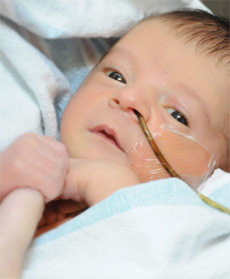fitness news
![]() ,
,![]()
Font size Women’s Health
Reducing neonatal infections in south and south central Vietnam: the views of healthcare providers
– Reported, May 24, 2013

Infection causes neonatal mortality in both high and low income countries. While simple interventions to prevent neonatal infection are available, they are often poorly understood and implemented by clinicians. A basic understanding of healthcare providers’ perceptions of infection control provides a platform for improving current practices. Our aim was to explore the views of healthcare providers in provincial hospitals in south and south central Vietnam to inform the design of programmes to improve neonatal infection prevention and control. Education through instructional posters and written guidelines, family contact, kangaroo-mother-care, limitation of invasive procedures and screening for maternal GBS infection were advocated by a smaller proportion of participants.
Facility-based neonatal care in Vietnam was very limited at the start of the 21st century, and generally provided by non-specialist paediatricians in the paediatric wards. In under ten years newborn care has been rapidly expanded and today all provincial hospitals have neonatal units, usually in a specially designated area of the obstetric or paediatric wards, with staff drawn from the Pediatric Department. These units are usually referred to as Neonatal Intensive Care Units (NICUs), but relatively few have the capacity to provide long-term mechanical ventilation.
Hand washing, cleaning the physical environment, safe disposal of medical waste and exclusive breastfeeding were the strategies most frequently scored asvery important for preventing neonatal infections. The WHO strongly advocates hand hygiene and exclusive breastfeeding for preventing and reducing infections . In Vietnam, extensive training has been conducted by the MOH and partners in the areas of hand hygiene (due to recent epidemics of SARS, avian influenza and H5N1 influenza), breastfeeding and safe disposal (ongoing WHO program on safety). The lesson seems to be well learned by healthcare providers involved in the present survey. National data on breastfeeding in Vietnam, however, indicate that only 58% of neonates are breastfed early, and only 17% of infants are exclusively breastfeeding at 6 months, so community-wide promotion of breastfeeding may be required.
Conversely, other issues deemed as relevant for infection prevention in low-resource settings, such as family contact, kangaroo-mother-care, limitation of invasive procedures, and screening for maternal GBS infection, appeared to be under-appreciated. Education through instructional posters and written guidelines, while strongly advocated by agencies involved in international programs in low-resource countries, was considered to be relatively unimportant in our sample. While there is a great need for continued research on cost-effectiveness of key interventions in setting with limited resources, understanding the prior opinions of clinicians involved in maternal and neonatal health can contribute to better design and implementation of intervention programs.
CREDITS.
Daniele Trevisanuto, Gaston Arnolda, Tran Dinh Chien, Ngo Minh Xuan, Le Thi Anh Thu, Danica Kumara, Ornella Lincetto, and Luciano Moccia
http://www.ncbi.nlm.nih.gov/
For more Vietnam News Click Here